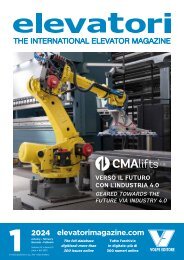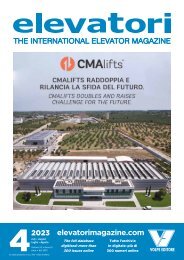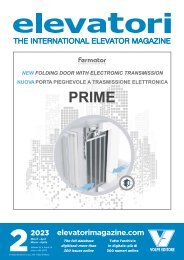Elevatori Magazine 1 - 2023
January - February
January - February
- TAGS
- elevatori magazine
Create successful ePaper yourself
Turn your PDF publications into a flip-book with our unique Google optimized e-Paper software.
to an increase in queues at the boarding of the<br />
lift. In complex ski resorts, where the ski day<br />
concatenates several lifts even on different<br />
sides of the mountains, this may cause great<br />
difficulty for users in returning to their starting<br />
locations. In any case, Anef declares that it<br />
will be careful to operate the lifts at a reduced<br />
speed compared to the nominal speed, especially<br />
during off-peak periods, penalising the speed<br />
of transport, but without creating queues at the<br />
boarding points. Energy management is even<br />
more difficult in the snow production sector,<br />
where the variables of wet temperature and<br />
wind must be given priority in order to make the<br />
production system efficient.ˮ<br />
Another question concerns the relationship<br />
between power supply and plant safety: how<br />
much does power supply affect plant safety?<br />
Is it plausible to foresee a virtuous energy<br />
(and therefore also economic) saving while at<br />
the same time guaranteeing safety? Franco<br />
Torretta states that “the safety of a ropeway<br />
installation is in no way compromised by the<br />
energy supply. All overhead ropeways are<br />
equipped with thermal motors that can operate<br />
the installation in the event of a power failure.<br />
The thermal motors can have the function of<br />
generator sets to replace the power supply or<br />
they can, normally through hydraulic drives<br />
connected to them, drive the system directly.<br />
In addition, the supervision and control<br />
system is powered, at 24V, by batteries that<br />
can ensure operation even in the absence of<br />
the mains supply.ˮ And he concludes: “In<br />
no way, therefore, can the absence of the<br />
electricity grid affect the safety of the transport<br />
and, consequently, no energy-saving strategy<br />
can compromise the drive and the plantʼs<br />
supervision and control system.ˮ •<br />
delle code all’imbarco dell’impianto. In<br />
comprensori sciistici complessi, laddove la giornata<br />
sci concatena svariati impianti anche su versanti<br />
diversi delle montagne, ciò potrebbe provocare<br />
grande difficoltà per gli utenti nel ritornare nelle<br />
località di partenza. In ogni caso, Anef dichiara<br />
di voler porre attenzione a esercire gli impianti<br />
a velocità ridotta rispetto a quella nominale,<br />
specialmente nei periodi di minor afflusso,<br />
penalizzando la rapidità del trasporto, ma senza<br />
creare code agli imbarchi. L’energy management è<br />
ancor più difficile nel settore di produzione neve,<br />
dove le variabili di temperatura umida e vento<br />
devono essere considerate prioritarie al fine di<br />
rendere efficiente il sistema di produzione”.<br />
Un’altra questione riguarda il rapporto fra fornitura<br />
elettrica e sicurezza dell’impianto: quanto incide la<br />
fornitura di energia sulla sicurezza degli impianti?<br />
È plausibile prevedere un risparmio energetico (e<br />
quindi anche economico) virtuoso e nel contempo<br />
garantire la sicurezza? Franco Torretta afferma<br />
che “la sicurezza di un impianto a fune non è<br />
in alcun modo compromessa dalla fornitura<br />
energetica. La totalità degli impianti a fune aerei<br />
è dotata di motori termici in grado di azionare<br />
l’impianto in caso di mancanza della fornitura<br />
elettrica. I motori termici possono avere la funzione<br />
di gruppi elettrogeni per sostituirsi alla fornitura<br />
della rete elettrica ovvero possono, normalmente<br />
attraverso azionamenti idraulici ad essi collegati,<br />
azionare direttamente l’impianto. Inoltre, il sistema<br />
di supervisione e controllo è alimentato, a 24V, da<br />
batterie in grado di assicurarne il funzionamento<br />
anche in assenza della rete elettrica”. E conclude:<br />
“In nessun modo, quindi, la mancanza di rete<br />
elettrica può incidere sulla sicurezza del trasporto<br />
e, di conseguenza, nessuna strategia di risparmio<br />
energetico può comprometterne l’azionamento e il<br />
sistema di supervisione e controllo dell’impianto”. •<br />
<strong>2023</strong> JANUARY | FEBRUARY • GENNAIO | FEBBRAIO <strong>2023</strong><br />
ELEVATORIMAGAZINE.COM<br />
67













